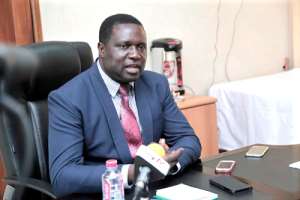
Today, we are proud to have launched our Spotlight on Basic Education Completion and Foundational Learning: Ghana. This report, conducted in collaboration with UNESCO’s Global Education Monitoring (GEM) Report and the Association for the Development of Education in Africa (ADEA), provides comprehensive, candid, and invaluable insights into our education system here in Ghana, with the 2022 Born to Learn Report, which will be launched on 20 October 2022, providing a more detailed view drawing on countries across the continent.
We welcome the completion and publication of this report especially given that foundational learning is the bedrock of our educational transformation here in Ghana.
The report marks a cornerstone in the development of education in Ghana, synthesising evidence, data, and contextually relevant research to guide and unite our progress toward a fulfilling, thorough education for all learners – one that allows children to have the opportunity to realise their place in Ghanaian society, through the country’s provision of accessible, high-quality education for all learners. Solutions to the challenges we currently face in achieving this ambitious, though entirely possible feat, are identified throughout the report, offering a unique opportunity to transform our education system, and improve learning outcomes throughout the country.
Over the last decade, Ghana has made great strides in the advancement of its education system. In 2017, we launched our Education Strategic Plan 2018–2030, which represented a landmark shift in the way education is structured. The plan oversaw the introduction of free secondary education for all learners, leading to an increase in students from 800,000 at the time of implementation, to 1.3 million at present. This figure is ever-growing. However, the focus extended far beyond access and included reforming the school structure, developing National Standards for teachers, and preparing and rolling out a new standards-based curriculum. It is clear that students who are encouraged to think independently rather than repeating what teachers have said, attain better learning outcomes. The recently developed guidelines to accompany the National Teachers’ Standards are helping teachers understand what is expected of them and should enable them to lead in such a way that learners can enjoy the freedom of critical thinking within the classroom. As a result, students can expect a communicative, collaborative, and creative style of teaching which provides them with skills that are hugely beneficial to the development of their education.
While considerable efforts across the country have already been made in the pursuit of high-quality education for all learners, with 77% of second-grade students still unable to read a single word and many schools reporting a lack of textbooks, the advice provided by the Spotlight Report on Ghana is fundamental to the continued improvement of learning outcomes.
The report focuses particularly on methods of developing teacher quality and the importance of providing structured support (including teaching and learning materials) to both teachers and to school leaders, a journey we have already started on. Over the last few years, the Ghana Education Service introduced the concept of weekly professional learning community sessions in schools in which teachers meet to discuss teaching styles and have the opportunity to share ideas on how to best implement the reforms of new curricula. The report highlights how those schools who have established regular professional learning community sessions tend to perform better than those that do not and recommends implementation of this initiative in all schools across the country, something that we are committed to doing. Furthermore, we have extended the length of teacher-training qualifications from three to four years. This will allow teachers to better acquaint themselves with effective and efficient learning styles, which they can adopt when they enter the classroom. We are also establishing a National Education Institute which will provide leadership training for all basic schools linked to our education leadership framework.
In recent years, Ghana has made bold commitments in the pursuit of quality education for all learners. Dedicated efforts across the community have the potential to transform education outcomes for Ghanaians across the country. Much remains to be done to achieve this, but the clarity of analysis and evidence-informed recommendations provided by the Spotlight Report on Ghana are critical in making this attainable.




 EC’s request to use Ghana Card as sole document for identification would’ve prev...
EC’s request to use Ghana Card as sole document for identification would’ve prev...
 Voter registration: Always check to avoid 2020 election results errors — Kwamena...
Voter registration: Always check to avoid 2020 election results errors — Kwamena...
 Voter registration: Ghana isn't safe; December polls might be 'each one for hims...
Voter registration: Ghana isn't safe; December polls might be 'each one for hims...
 Rapid decline of our country, its democratic institutions worrying, distressing ...
Rapid decline of our country, its democratic institutions worrying, distressing ...
 Religious tolerance: My brothers and sisters are Christians, I cannot say that I...
Religious tolerance: My brothers and sisters are Christians, I cannot say that I...
 CSOs consider civil action against gov't over alleged destruction of protected f...
CSOs consider civil action against gov't over alleged destruction of protected f...
 Domelevo, Kpebu, Gyampo and 83 others petition parliament to probe EOCO’s conduc...
Domelevo, Kpebu, Gyampo and 83 others petition parliament to probe EOCO’s conduc...
 “Take precaution, don’t be in a hurry to go and die” — Author advise drivers, pe...
“Take precaution, don’t be in a hurry to go and die” — Author advise drivers, pe...
 Electoral Commission has been reduced to 'Error Commission' in simple arithmetic...
Electoral Commission has been reduced to 'Error Commission' in simple arithmetic...
 Banking clean-up helped prevent collapse of financial sector – Bawumia
Banking clean-up helped prevent collapse of financial sector – Bawumia
